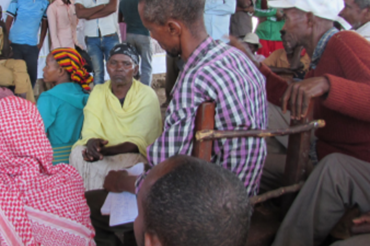
Project
Land registration: the foundation of sustainable development in Ethiopia

Project
Agriculture is a pivotal sector within Ethiopia that resonates deeply with its people. With over 80% of the population engaged in agricultural and related pursuits, the significance of land control cannot be overstated. Contributing substantially, agriculture constitutes 45% of Ethiopia's GDP. As a vast majority of Ethiopian farmers are subsistence farmers, they rely heavily on their land parcels and the harvests they produce for sustenance.
In Ethiopia, rural life is intricately tied to agriculture, yet a unique land tenure system prevails; the State retains ownership of the land and confers land usage rights to its citizens. While this arrangement presents challenges for rural farmers, it particularly impacts women, given prevailing cultural norms that ascribe land use and control as primarily "men's concerns." Consequently, despite protective legal provisions for women's rights to claim and maintain land, these laws often languish without enforcement, exposing women to the risk of losing their tenure rights.
Furthermore, due to a number of issues that are too complex to explain here, vast tracts of land in Ethiopia remain undesignated and undeveloped, but the lack of land tenure security means that investment in agriculture is often too risky. This results in people utilizing the land they occupy in exploitative, damaging ways to derive a short-term benefit, as they feel a sense that the land they’re on is “here today, gone tomorrow”. The long-term economic development of the agricultural sector suffers as a result, which in turn poses challenges to the development goals of Ethiopia’s economy as a whole. Ethiopia wants to move from being an agrarian economy to a manufacturing-based economy, but it needs to walk before it can run. To put things very simply, Ethiopia needs to develop its agricultural sector in economic and commercial terms, so that the resulting economic growth can help fund its manufacturing developments. However, sustainable agricultural development takes investment by its stakeholders, and investment requires security.
Helping to address this issue, the Finnish Ministry for Foreign Affairs launched the Responsible and Innovative Land Administration (REILA) project. The programme's main goal is to improve the land administration system and thereby provide tenure security to the people who have claimed and registered plots of land in the target regions of Amhara and Benishangul-Gumuz. NIRAS has managed both phases of the now 12-year project with funding of EUR 8.8M for the second phase.
REILA offered on-the-job training and technical training to various government employees in the Land Administration sector. Part of the project was also focused on upgrading the infrastructure used to do the land registrations. An IT system, the National Land Administration Information System (NRLAIS), was launched and adopted for use in the target regions and scaled-up across the country. The system stores the official land holding data, handles systematic land registration, and manages continuous land transactions. Satellite images and aerial photographs are maintained in NRLAIS servers and used to identify and process the boundaries between different land holders. Over 1,400 government employees have been trained to use or administer NRLAIS.
An operational manual was created for surveyors carrying out the fieldwork, and higher education programs were established to further educate those in the Land Administration Sector. A fast-track rural land administration course was developed under REILA phase I and has continued to date with a total of 6,200 graduates, 23% of whom were women. In addition, REILA helped launch an MSc program, which trained and yielded 53 experts within REILA’s partner institutions. These courses have been accredited by the Ethiopian government and are set for a wider implementation.
Part of the equitable distribution of land involves ensuring that parcels are registered to women as well as men, preventing discrimination and ensuring women’s full and effective participation in the process. Of the approximately 1.2 million land parcels registered during REILA phase II, 77% were registered to women, either jointly within marriage, or to female-headed households. This development represents a significant distribution of wealth to those women, which in turn offers them a huge improvement in their livelihoods and their families’ welfare.
Phase I was so successful that the Ethiopian Government formally adopted REILA’s methods for registering rural lands all over the country – about 50 million plots of land in total. Improved land registration systems under REILA phase II has benefitted around 310,000 households in the project target regions, with over 24M parcels registered by the Government under projects using the pioneering REILA approach.
You can read a personal story of REILA's impact here.
Public information, gender equality and social inclusion guide for 2nd level land registration
certified land parcels
individuals supported
households issued with certificates
REILA has changed the mind-set of decision makers in the land administration and assisted to develop a harmonized system to register all the land in Ethiopia
Ato Sileshi Getahun, Ethiopia’s former State Minister of the Ministry of Agriculture
REILA II was focused on building on the strong foundations laid in Phase I. The main goals of this phase were to continue the roll-out of NRLAIS, and the continued monitoring and evaluation of the methods used by REILA to complete the land registrations. REILA also aimed to further support the National Geospatial Information Agency in improving the national reference systems needed for more accurate land surveying, for instance in peri-urban areas.
In addition to the systematic improvements, REILA continues to
The focus on equitable and efficient distribution of land helps decrease poverty as per SDG 1.4. It also decreases hunger as per SDG 2.3, as security of tenure allows for the sustainable cultivation of farm land.
Part of the equitable distribution of land involves ensuring that plots are registered to women as well as men, thus preventing discrimination (SDG 5.1) and ensuring women’s full and effective participation in the process as per SDG 5.5.
The land tenure security and the education that result from REILA’s process encourages stakeholders in the registration (including the farmers) to make use of sustainable practices to lessen negative impacts on the environment (SDG 13.3, 15.1, 15.2, 15.3, 15.4, and 15.5).
Download the REILA Impact on Women Statement




